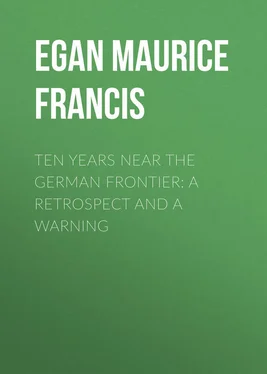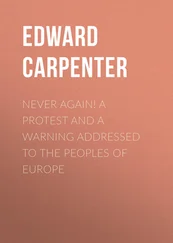Maurice Egan - Ten Years Near the German Frontier - A Retrospect and a Warning
Здесь есть возможность читать онлайн «Maurice Egan - Ten Years Near the German Frontier - A Retrospect and a Warning» — ознакомительный отрывок электронной книги совершенно бесплатно, а после прочтения отрывка купить полную версию. В некоторых случаях можно слушать аудио, скачать через торрент в формате fb2 и присутствует краткое содержание. Жанр: foreign_antique, foreign_prose, на английском языке. Описание произведения, (предисловие) а так же отзывы посетителей доступны на портале библиотеки ЛибКат.
- Название:Ten Years Near the German Frontier: A Retrospect and a Warning
- Автор:
- Жанр:
- Год:неизвестен
- ISBN:нет данных
- Рейтинг книги:5 / 5. Голосов: 1
-
Избранное:Добавить в избранное
- Отзывы:
-
Ваша оценка:
- 100
- 1
- 2
- 3
- 4
- 5
Ten Years Near the German Frontier: A Retrospect and a Warning: краткое содержание, описание и аннотация
Предлагаем к чтению аннотацию, описание, краткое содержание или предисловие (зависит от того, что написал сам автор книги «Ten Years Near the German Frontier: A Retrospect and a Warning»). Если вы не нашли необходимую информацию о книге — напишите в комментариях, мы постараемся отыскать её.
Ten Years Near the German Frontier: A Retrospect and a Warning — читать онлайн ознакомительный отрывок
Ниже представлен текст книги, разбитый по страницам. Система сохранения места последней прочитанной страницы, позволяет с удобством читать онлайн бесплатно книгу «Ten Years Near the German Frontier: A Retrospect and a Warning», без необходимости каждый раз заново искать на чём Вы остановились. Поставьте закладку, и сможете в любой момент перейти на страницу, на которой закончили чтение.
Интервал:
Закладка:
In April 1908, King Edward VII. and Queen Alexandra made a visit to Copenhagen. It was the custom in Denmark that, when a reigning sovereign came on a gala visit, the Court and the diplomatists were expected to go to the station to meet him. The waiting-room of the station was decorated with palms which had not felt the patter of rain for years, and with rugs evidently trodden to shabbiness by many royal feet. Amid these splendours a cercle was held.
The visiting monarch, fresh from his journey, spoke to each of the diplomatists in turn. He dropped pearls of thought for which one gave equally valuable gems.
'The American Minister, Your Majesty,' said the Chamberlain. 'Glad to see you; where are you from?' 'Washington, the capital.' 'There are more Washingtons?' 'Many, sir.' 'How do you like Copenhagen?' 'Greatly – almost as well as London' (insert Stockholm, Christiania, The Hague, to suit the occasion).
And then came the voice of the Chamberlain – 'The Austrian Minister, Your Majesty.' 'How do you like Copenhagen?' The same formula was used until the chargés d'affaires , who always ended the list, were reached: 'How long have you been in Copenhagen?'
King Edward was accompanied by a staff of the handsomest and most soldierly courtiers imaginable; they were the veritable splendid captains of Kipling's Recessional . Queen Alexandra was attended by the Hon. Charlotte Knollys and Miss Vivian. It was a great pleasure to see Miss Knollys again. To those who knew her all the tiresome waiting was worth while; she seemed like an old friend.
The police surveillance was not so strict when the King and Queen of England were in Copenhagen; but when any of the Russian royalties arrived, the police had a time of anxiety though they were reinforced by hundreds of detectives.
In Copenhagen it was always said that the Empress Dowager, the Grand Duke Michael, the Archduchess Olga, and others of the Romanoff family, were only safe when in the company of some of the English royal people. The Empress Dowager of Russia, formerly the Princess Dagmar of Denmark, never went out without her sister. They were inseparable, devoted to each other, as all the children of King Christian IX. were. It was not the beauty and charm of Queen Alexandra that saved her from attack; it was the fact that England was tolerant of all kinds of political exiles, as a visit to Soho, in London, will show.
At the station, just as the King and Queen of England entered, there was an explosion. 'A bomb,' whispered one of the uninitiated. It happened to be the result of the sudden opening of a Chapeau claque in the unaccustomed hands of a Radical member of the Cabinet who, against his principles, had been obliged to come in evening dress.
We, of the Legation, always wore evening dress in daylight on gala occasions. One soon became used to it. Our American citizens of Danish descent always deplored this, and some of our secretaries would have worn the uniform of a captain of militia or the court dress of the Danish chamberlains, which, they said, under the regulations we were permitted to wear. Not being English, I found evening dress in the morning not more uncomfortable than the regulation frock coat. I permitted a white waistcoat, which the Danes never wore in the morning, but refused to allow a velvet collar and golden buttons because this was too much like the petit uniforme of other Legations.
There was one inconvenience, however – the same as irked James Russell Lowell in Spain – the officers on grand occasions could not recognise a minister without gold lace, and so our country did not get the proper salute. On the occasion of the arrival of the King of England, I remedied this by putting on the coachmen rather large red, white and blue cockades. Arthur and Hans were really resplendent!
Later, when my younger daughter appeared in society after the marriage of the elder, there was no difficulty. All the officers who loved parties recognised the father of the most indefatigable dancer in court circles. A cotillion or two at the Legation amply made up for the absence of uniforms. Our country, in the person of its representative, after that had tremendously resounding salutes.
Prince Hans, the brother of the late King Christian IX., who has since died, was especially friendly with us. He was beloved of the whole royal family. His kindliness and politeness were proverbial. When he was regent in Greece, he had been warned that the Greeks would soon hate him if he continued to be so courteous. His equerry, Chamberlain de Rothe, told me that he answered: 'I cannot change; I must be courteous.' He is the only man on record who seems to have entirely pleased a people who have the reputation of being the most difficult in Europe.
Prince Hans came in to call, at a reasonable time, after the arrival of the King and Queen of England; we were always glad to see him; he was so really kind, so full of pleasant reminiscences; he had had a very long and full life; he was the 'uncle' of all the royalties in Europe. He especially loved the King of England. Having lived through the invasion of Slesvig, he was most patriotically Danish; he looked on the Prussians as an 'uneasy' people.
'The King of England is much interested in the condition of your ex-President, Grover Cleveland,' he said. 'If you will have him, he will come to tea with you; I will bring him. He is engaged to dine with the Count Raben-Levitzau and, I think, to go to the Zoological Gardens and to dine with the Count Friis; but he will make you a visit, to ask personally for ex-President Cleveland and to talk of him after, of course, he has lunched at the British Legation.'
I said that the Legation would be deeply honoured. Informal as the visit would be, it would be a great compliment to my country.
'The German Legation will be surprised; but it can give no offence; I am sure that it can give no offence. King Edward is not pleased altogether with his nephew. When the emperor came to Copenhagen in 1905 he was not so friendly to us as he is now. Poor little Denmark. It has escaped a great danger through Bertie's cleverness,' Prince Hans murmured. From this I gathered that Prince Hans felt that the king's coming to the American Legation would be noticed by all the Legations as unusual, but especially by the German Legation. From this I judged that some danger to Denmark might have been threatening.
'The Kaiser dined in this room,' Prince Hans said, 'when he was here in 1905 – no, no, he took coffee in this room, and not in the dining-room. However, as Madame Hegermann-Lindencrone has told, the German Minister, von Schoen, who gave so many parties that all the young Danish people loved him, and his wife could not decide where coffee was to be taken; the Kaiser settled it himself. It is an amusing story; it has made King Frederick laugh. If the King of England comes to tea, you will not be expected to have boiled eggs, as we have for the Empress Dowager of Russia and Queen Alexandra and King George of Greece, some champagne, perhaps, and the big cigars, of course.'
'And, as to guests?'
'Only the Americans of your staff, I think, who have been already presented to the king.'
The announcement that the King of England would take tea with us did not cause a ripple in the household; the servants were used to kings. King Frederick had a pleasant way of dropping in to tea without ceremony, and the princesses liked our cakes. Besides, Hans, the indispensable Hans, had waited on King Edward frequently, so he knew his tastes. But the king did not come; Prince Hans said that he was tired. He sent an equerry, with a most gracious message for Grover Cleveland, and another inquiry as to his health. The royal cigars lasted a long time as few guests were brave enough to smoke them. The king at the Cercle at court was most gracious. 'I hope to see you in London,' he said. My colleagues seemed to think that his word was law, and that I would be the next ambassador at the Court of St. James's. I knew very well that his politeness was only to show that he was in a special mood to manifest his regard for the country I represented.
Читать дальшеИнтервал:
Закладка:
Похожие книги на «Ten Years Near the German Frontier: A Retrospect and a Warning»
Представляем Вашему вниманию похожие книги на «Ten Years Near the German Frontier: A Retrospect and a Warning» списком для выбора. Мы отобрали схожую по названию и смыслу литературу в надежде предоставить читателям больше вариантов отыскать новые, интересные, ещё непрочитанные произведения.
Обсуждение, отзывы о книге «Ten Years Near the German Frontier: A Retrospect and a Warning» и просто собственные мнения читателей. Оставьте ваши комментарии, напишите, что Вы думаете о произведении, его смысле или главных героях. Укажите что конкретно понравилось, а что нет, и почему Вы так считаете.












